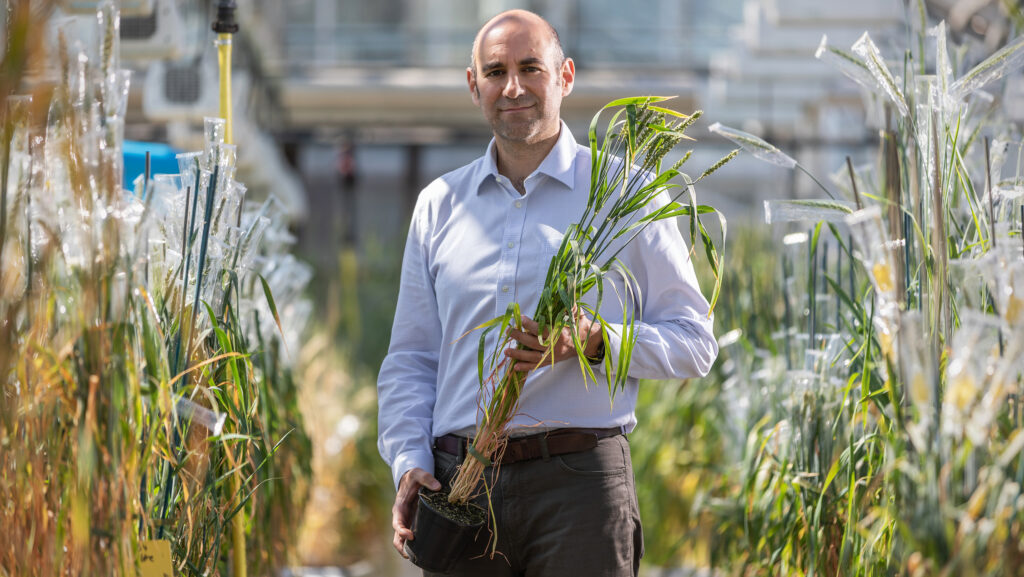Game Changers: Cristobal Uauy, the plant scientist
 Cristobal Uauy © Richard Stanton
Cristobal Uauy © Richard Stanton Prof Cristobal Uauy has been nominated for our special Game Changers Award, which will be announced at Farmers Weekly Awards on 3 October 2024.
An agronomist by training, Cristobal is a wheat geneticist working to improve crop yields and quality at the John Innes Centre, near Norwich.
Cristobal’s laboratory and team of scientists are behind some of the most exciting recent developments in UK plant breeding – including traits which help protect wheat crops against pests and diseases.
See also: Game Changers: Stephanie Berkeley, the farm safety campaigner
“I’ve always been fascinated with the idea of producing enough food to feed the world in a way that is healthy,” says Cristobal.
“With genetics and modern plant breeding technologies, we are improving food security too.”
The laboratory uses molecular genetic approaches to identify genes which can improve wheat productivity.
This scientific knowledge is then used to create improved varieties which benefit farmers, food processors and consumers.
What is a Game Changer?
This unique category – created to mark the 20th anniversary of the Farmers Weekly Awards – recognises individuals who have driven innovation that has had a positive impact on food and farming in the past 20 years.
Nominees might be professionals, academics, scientists, researchers, environmentalists, or anyone else making significant contributions to the agricultural industry.
Read more about the Game Changer Award.
At a glance: Prof Cristobal Uauy, the John Innes Centre, Norwich
- Ground-breaking research on wheat genetics
- Building in traits against crop pests and diseases
- Working with scientists from across the world
- At the forefront of gene-editing technologies
Success stories
Keen to stress that much of his work involves collaborating with scientists around the world, Cristobal’s success stories include identifying genes responsible for wheat yellow rust resistance and the SM1 gene for orange wheat blossom midge resistance. Growers are benefiting from this work.
“It’s about identifying the individual genes that control the traits, and then providing plant breeders with the tools so they can use them in their breeding programmes to create new varieties.”
Ultimately, he says, it is about ensuring food production is sustainable, feeding the world using fewer chemicals and less fertiliser.
“It’s about what we now call regenerative agriculture – that is the aim of what we are doing.”
The research is important because across the world almost everyone eats wheat in some form or another – whether it is pasta or noodles or naan bread.
“All societies eat a lot of wheat, so we need to produce a huge amount of it.”
Exciting future
But it’s not just about producing more. “Food has to be healthy and nutritious, which means the right quality and protein levels.
“And the challenge of climate change means it needs to have a lower environmental footprint too.”
To achieve this, Cristobal and his team are combining genetics and genomics with plant biology – striving to understand which genes make the grain heavier, or longer and wider, because this is what influences yield in the field.
Gene-editing promises to be a huge game changer, believes Cristobal.
It will help speed up the plant breeding process – providing farmers with more beneficial traits and new improved wheat varieties more quickly.
“It is extremely exciting. It’s not just about developing gene-editing in the laboratory, it is about genetically editing commercial cultivars and Recommended List varieties.
“That is something we can now do. It is going to be a big change.”
A word from our sponsor 
Lightsource bp is an international solar business. Our long-running relationship with farmers and the UK farming industry, and our commitment to bolstering the rural economy is why Game Changers is such a good fit for our business – we’re proud to be sponsoring an award celebrating the pioneers of the sector.


